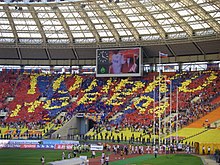Great Moscow Derby

|

|
The encounter between Spartak Moscow and CSKA Moscow has been known as the Grand Moscow Derby ( Russian Главное московское дерби ) since the early 21st century . For much of the 20th century, the games between Spartak and Dynamo Moscow were considered the most important Moscow derby . Fans and ultras of the clubs CSKA and Dynamo are allies and Spartak is their main common enemy.
History of the great Moscow rivalries
Spartak quickly became the most popular club in Russia and has remained so to this day. In contrast to the former army sports club CSKA, which was subordinate to the Ministry of Defense, and the Dynamo, which was formerly subordinate to the Ministry of the Interior and affiliated to the KGB , both of which embodied the political system of Soviet communism as such, Spartak has always been considered an "opposition" people's association.
The Spartak myth
Spartak was founded by the four Starostin brothers who wanted to keep the club politically independent, which made it a political issue. a thorn in the side of the mighty and popular and admired in large parts of the population. The Red and White team suffered a severe blow when all four Starostin brothers were convicted of "high treason" in 1942 and sent to a prison camp in Siberia , where they remained until Stalin's death in March 1953. But this setback, which also set the team back in terms of sport, ultimately benefited the club more than harmed it. From then on it was considered a kind of silent protest to support the team and so Spartak became the undisputed darling of the political opposition in Moscow and in large parts of Russia.
Rivalry between Spartak and Dynamo
Because of the relationships described above to Spartak was in a role that in the GDR from Union Berlin and Chemie Leipzig was represented. Compared to these two clubs, however, Spartak was more than one size bigger because in addition to the intended role of the "political troublemaker", corresponding sporting successes were also recorded. Despite some actual and sometimes only felt political disadvantage, Spartak was the most successful Moscow club in the old Soviet Union with twelve championship titles . The second most successful Moscow club was Dynamo (eleven times champions), so that their direct encounter was considered "the most important game in Moscow". The army sports club ZSKA - which was champion seven times, but had its heyday in the years immediately after the Second World War, when it won five of its seven titles (the other successes came in 1970 and 1991) - was otherwise only valid for long periods as the "third force".
But Dynamo soon owed its role as the most respected Moscow counterpart to Spartak more to the result of old heydays than to the (less successful) sporting present. After all, after the ten championship titles won by 1963, only one championship win was added in 1976.
Rivalry between Spartak and CSKA
In the first ten years of the 1992 newly introduced Russian league , Spartak developed into series champions with nine titles (only in 1995 the championship was won by Alania Wladikawkas ), so that their dominance soon threatened to be bored. But after the sporty newcomer Lokomotiv Moscow was able to break their dominance in 2002 , Spartak not only waited in vain for another championship title until 2017, but was also ousted from the top group of Russian club football for a long time. Meanwhile, the former army sports club CSKA has developed into the new Moscow top club, which has won six Russian championship titles since 1998 and has been runner-up eight times. He has also won the domestic cup competition seven times since 2002, and in 2005 he won the UEFA Cup for the first time in Moscow with a European title. Because of this development, the game between the recently very successful CSKA and the still most popular Moscow club Spartak is now considered the most important Moscow city derby.
Individual evidence
- ↑ Peterjon Cresswell & Simon Evans: The Rough Guide to European Football - A Fan´s Handbook 2000-2001 , London: Rough Guides, 2000, pp. 477, 480 / ISBN 1-85828-568-2
- ↑ Omar Gisler: Football Derbies - The 75 football-madest cities in the world , Munich: Copress, 2007, p. 167 / ISBN 978-3-7679-0883-3
- ↑ Simon Kuper: Football against the Enemy , London: Phoenix (a division of Orion Books Ltd.), 1999, p. 42f / ISBN 0-75380-523-5


